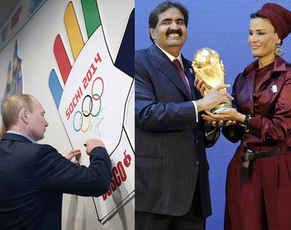
Another major event that has found itself under the spotlight is the 2022 World Cup in Qatar. Again, huge sums of money, some estimates suggest $200bn, will be spent on constructing new stadia and infrastructure. As of now, the event is due to take place in the summer in temperatures of up to 50 degrees celsius, though noises have been made about switching it to winter which, if it happens, will have a severely disruptive impact on European football leagues. Again, hosting the World Cup seems to be part of a political project to boost Qatar’s global image (see here).
Various economists have produced an extensive literature showing how investing in such mega-events is almost always loss-making in monetary terms, as the expected benefits are usually over-estimated and the costs under-estimated, often deliberately so. Event proponents often fail to account for things like the substitution effect, crowding out, etc. and focus on gross, rather than net, effects. As well as this, the opportunity costs of spending public money are either ignored or under-stated. On the other hand, hosting events does tend to make the host population happier, as pointed out here by Robbie Butler.
Both Russia and Qatar have been criticised for the huge sums spent, while the deaths of migrant workers while constructing stadia in Qatar have also been well publicised (see here). In addition, some of this criticism has spilled over to the IOC and FIFA for having awarded the events to these countries in the first place. Even the normally infallible Sepp Blatter has conceded that awarding the World Cup to Qatar may have been a mistake, though not surprisingly, he shifts the blame to European governments’ desire to open up trade and investment links with resource rich Qatar (see here again).
Will the controversies over Sochi and Qatar (and similar issues in Brazil regarding this year’s World Cup) lead to a shake-up of how the IOC and FIFA decide who to award such events to? It is impossible to know for sure at this stage, but if changes are to occur, it is likely that a combination of money, ego and people power will be the driving forces. Even powerful political institutions like the IOC and FIFA know when too much negative publicity is detrimental to sport and, possibly, to their officials’ positions. Cycling chiefs learned this the hard way. If upcoming mega-events, which have incurred major public expenditure costs, suffer from reduced interest and lower TV audiences, possibly as a form of protest, then it is possible that future awarding of mega-events will be subject to a ‘ready to host’ criterion. If this happens, future mega-events will be awarded to countries that already have the capacity to host such events and will not requiring a major public investment that adversely impacts the rest of society.
 RSS Feed
RSS Feed